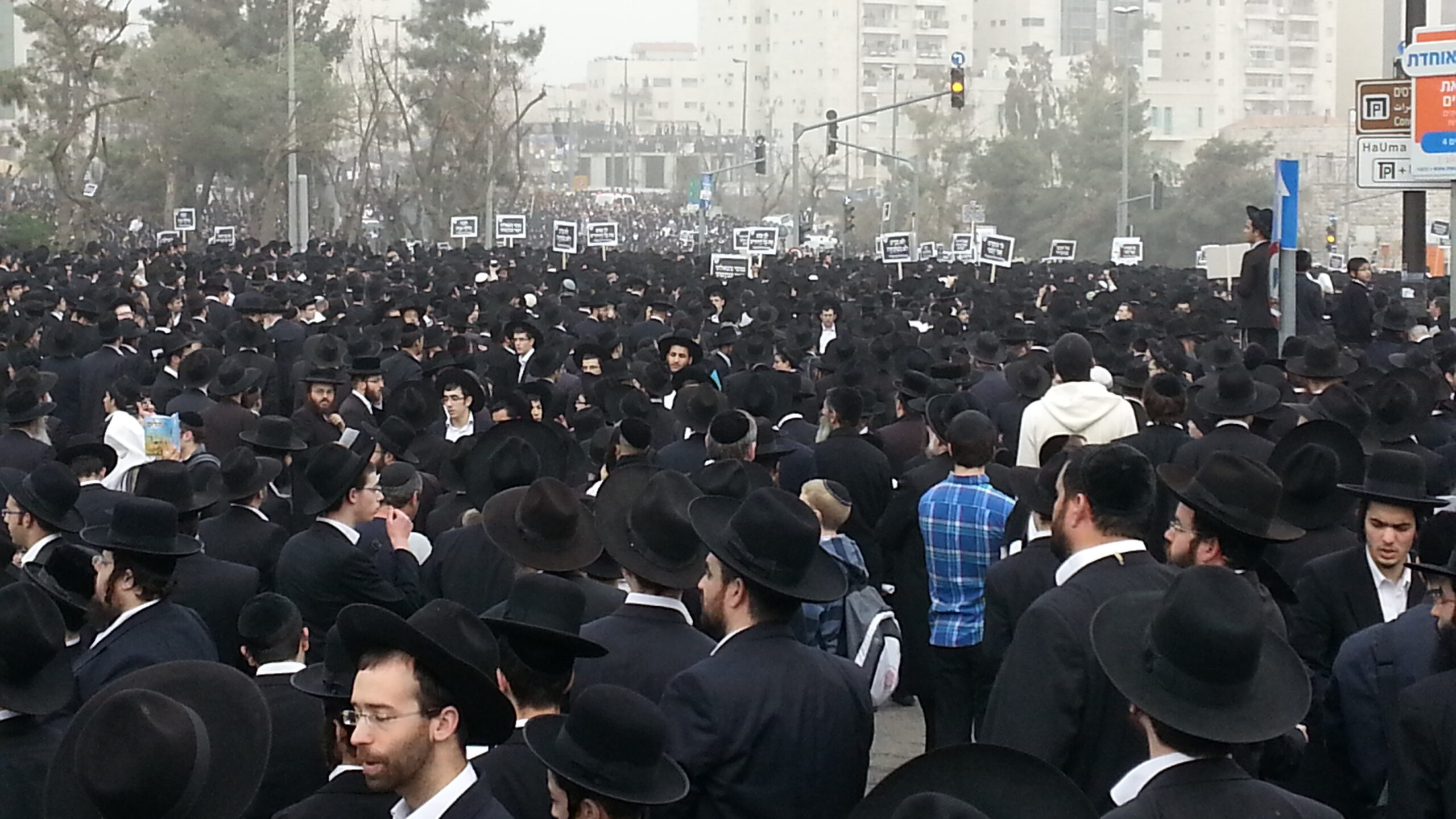Paul Scham and Ron Skolnik
Israel’s comprehensive draft requires military service by almost all Jewish citizens, male and female, and by men in some other groups such as Druze and Circassians (most Palestinian citizens are not drafted). The largest — and most controversial — exemption affecting Jewish men applies to “ultra-Orthodox” (Haredi, pl. Haredim) yeshiva students. When first introduced in 1948, this policy covered 400 students; but in the last year, 66,000 received such deferments, reflecting the increase of Haredim in the Israeli population from less than 1% to the current 13% (many ultra-Orthodox families have eight children or more). Meanwhile, a whole Haredi culture has developed to ensure that their men won’t be drafted. Community leaders claim that studying holy texts all day serves to protect Israel as much as do the Israel Defense Forces; others say the real reason is so that Haredi youth, who are strictly segregated from the rest of Israeli society, do not come into contact with the secular world and might be tempted to flee the restrictive Haredi lifestyle.
The growing number of Haredi exemptions — combined with ever-increasing financial demands for Haredi institutions supported by skyrocketing numbers of Haredi voters — has created a backlash in Israeli society. In 1998, the Supreme Court ruled that the government must produce a more equitable draft law. Since then, the issue has been kicked back and forth between the government, the courts, civil society organizations demanding fairness, and Haredi institutions and parties insisting the status quo be retained. Most recently, the Supreme Court ordered the government to show cause for why it should not begin drafting yeshiva students as of April 1.
It is worth noting that the IDF has no desire to see Haredim drafted. Besides their negative attitude toward service, it is assumed that most would not meet the basic educational or fitness standards of the army. Haredim have their own independent educational “stream,” which accepts government funding but not government control. Thus, male Haredi students take little or no math beyond arithmetic; they spend virtually all their time studying holy texts, preparing them for a life of religious scholarship and little else. While the IDF, given the Gaza war, could use a few thousand more soldiers and is currently increasing service requirements slightly, it would take significant resources to prepare thousands of Haredim for military service. The lawsuits come from outraged citizen groups, not the military.
However, this is by no means an arcane dispute affecting solely yeshiva students. If the government starts drafting them, it is assumed that the two Haredi parties will immediately exit the ruling coalition, in which they hold 18 Knesset seats out of 64. Without a supporting majority in the 120-member legislature, the government would almost certainly fall, leading to new elections within three to six months. Given that Prime Minister Netanyahu currently has a favorability rate of about 19% — and his Likud party, according to current polls, would receive about 18 seats compared to the 32 it now holds — there seems little chance he would remain as prime minister after a new election.
Meanwhile, some figures are presenting creative third-way approaches. Uri Zaki, chair of the Meretz executive, and Rabbi David Stav of the relatively liberal Tzohar association of Modern Orthodox rabbis, are lobbying to amend the conscription law so that exemptions are requested and granted individually on religious grounds. The current system is based on the alleged need for haredi men to make Torah study their vocation (the “Torah is their craft” principle). The change would allow Israel to integrate Haredi men into the workforce since they would no longer be chained to a yeshiva to justify not serving. There would also be additional State incentives to encourage IDF service.
The second outcome of the Zaki-Stav proposal would be to weaken Haredi power brokers who currently control the process. The present law requires exemptions to be requested collectively by yeshiva heads on behalf of the young men. This practice would end. Zaki and Stav acknowledge that their initiative therefore challenges vested interests in the Haredi world and could alter the very structure of ultra-orthodox society. But they continue to advocate for their idea within the Haredi community where they have been engaging with figures outside the traditional power structure – even if their chances for success seem low.
There is increasing clamor for a new national election, and some members of the special War Cabinet are growing restive. Nevertheless, if the past 28 years are any guide, the draft issue is unlikely to precipitate an end to the current government in the coming weeks; some workaround will be found. Rather, it will just add to the government’s tensions and unpopularity — and its fury at the Supreme Court.
A version of this article was originally published on the website of the Middle East Institute.
—-

Paul Scham is president of Partners for Progressive Israel and a Professor of Israel Studies at the University of Maryland.

Ron Skolnik is an American-Israeli political columnist and public speaker, whose articles have appeared in a variety of publications, including Haaretz, Al- Monitor, Tikkun, the Forward, Jewish Currents, & the Palestine-Israel Journal.
.







Leave A Comment